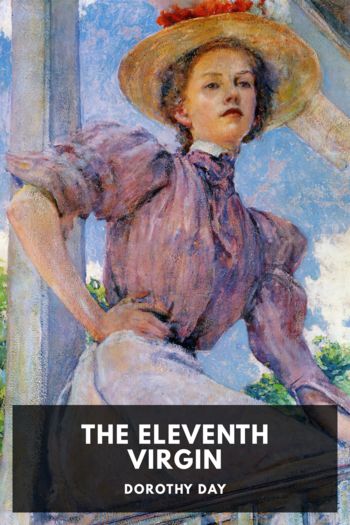The Eleventh Virgin by Dorothy Day (important books to read .TXT) 📕

- Author: Dorothy Day
Book online «The Eleventh Virgin by Dorothy Day (important books to read .TXT) 📕». Author Dorothy Day
“You’re wasting enough paper there,” she remarked as another sheet fell to the floor.
“I can’t exactly get it. Is that the moral support which I hear boiling? If it is, you’ll find cream on the windowsill and an extra cup in the closet on the floor. Whew! That’s hot,” and she set the cup of coffee on the floor by her low bed. “And now I’ll tell you what else you can do for me. Just strip off your clothes—the room’s warm enough, and while you’re drinking your coffee I’ll sketch you.”
Although June would not have thought of undressing before her mother or Adele, it was impossible to refuse Billy’s request. So June quickly slipped out of her clothes and curled up on the end of the sofa which was softer than the chair and solaced herself for the discomfort of unaccustomed nudity with a cigarette.
“You have just the sort of impalpable figure that I am expected to draw for that blooming magazine,” Billy said with satisfaction as she started to work. “Don’t try to sit still. Move around all you want to. I want just a general impression, anatomically correct and yet impossibly lissome. I really think you more nearly approach the sort of stuff I draw than anybody I’ve ever seen. You’ll probably have a beautiful figure by the time you’re thirty. Have the men around here started to make love to you? You’re just the type, you know.”
June didn’t know what the type was, but she told her friend, “Yes, very nicely. But not violently enough to be convincing.”
“What do you want them to do? Rape you? Violence has gone out of fashion, don’t you know that?”
“I enjoy it immensely until they try to kiss me. But there is a sort of futility about their love making. It’s purposeless—as though they did it because everybody else does it. I don’t get half so many thrills as I thought I would when I became grown up and untrammeled.”
“Unawakened,” said Billy with her pencil in her mouth.
“No, pure, Ellen Winter would say,” June put in rather maliciously.
“It’s a lucky thing I don’t live at home now,” June told Adele on one of her frequent visits home. “I’d have so much to talk about that you’d never get a word in edgewise. It’s all about causes, too—the poor working girl, the police system, homes for fallen women and how they should be run, birth control, pacifism and any number of other things. But all I have time to tell you about are my adventures.”
“We’d a great deal rather hear them than the conclusions you draw from them,” Mother Grace said. “They’re bad enough for a mother to hear about anyway. Can’t you manage to avoid some of these experiences of yours?”
“I don’t go out of my way looking for them,” June protested aggrievedly. “If they worry you, I won’t tell you any more.”
“Of course you’ll tell me. I’d rather know exactly what I’m worrying about. I should worry in any case. If you didn’t keep me informed as to what you were doing and where you were living, think how shocked I would have been when Mrs. Gunther called me up that time.”
The woman that Mother Grace referred to was the chief factor in an unpleasant experience June had had several months after she had left home. On the lower East Side near the river she stumbled upon an old parish house next to an Episcopalian church that had a slave gallery. She explored the church which had been opened for a vesper service and wished also to explore the parish house next door when she noticed a small sign tucked unobtrusively away in one window announcing that there were rooms for rent. She was immediately fascinated by the somber atmosphere of the place, and the result was she rented the room (two dollars a week) and moved in the next day. It was the completeness of its desolation which attracted her. The first floor was occupied by a young woman with an old husband, the rector of the church. Mrs. Gunther puttered around the two rooms on the first floor of the house where she and her husband lived, leaving her lodgers to care for their own rooms as best they could. The beds were never made, the floors were never swept, clean towels were scarce and hot water was unknown.
On four sides of a square hall four doors opened into the lodgers’ rooms. June heard them open and shut in the morning, but she never saw the occupants in all the two months she remained there and since the doors were never open, she didn’t have a chance to peep in to see if they were as bleak as her own. Her room was on the side next to the church and Sunday mornings as she lay in bed, the mournful music of the organ seeped into her open window and lit up the greyness about her. Even in the middle of the day it was never a light room and on cold nights when she heated it by means of a gas stove which was attached to a solitary burner, she had to read by candlelight. There was no carpet on the floor and no curtain at the one window which faced the church. It was perfect in its dreariness and silence, and when June came in after a busy day and evening when she had interviewed and notated and written and lived the day with the clatter of voices and of typewriters in her ears, she stood still and drank in the silence. She enjoyed the damp old smell of the house, she enjoyed





Comments (0)